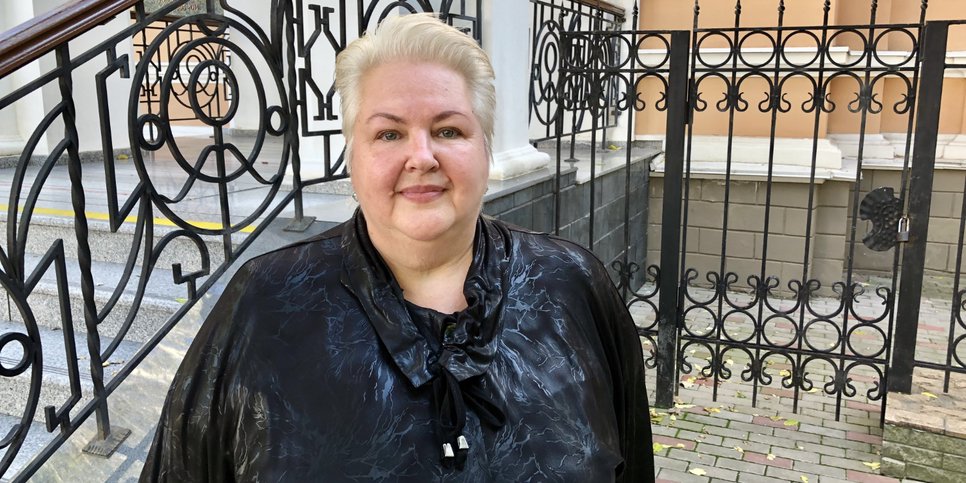Photo: Olga Ganusha on the day of the appeal, Rostov-on-Don
Photo: Olga Ganusha on the day of the appeal, Rostov-on-Don
Appeal in Rostov-on-Don Upheld the Sentence Against 60-Year-Old Believer Olga Ganusha
Rostov RegionOn September 30, 2021, the panel of judges of the Rostov Regional Court rejected the appeal of Olga Ganusha from Rostov-on-Don on the conviction for her choice of religion. The believer still insists on her innocence. She has the right to appeal against the sentence that has entered into force in cassation procedure, as well as in international instances.
“My heart is filled with love for God and my neighbor. I encouraged people to read God's Word and learn goodness, love, justice. I have never experienced any hostility or hatred and do not feel it towards any person. If the prosecution insists on my involvement in extremism, it is from ignorance and misunderstanding of the essence of what is happening. Everything has its time. Perhaps these people will someday open their eyes,” Olga Ganusha said in court before the appeal.
Earlier, on July 13, 2021, the judge of the Voroshilovsky District Court of Rostov-on-Don, Viktor Trofimov, sentenced 60-year-old Olga Ganusha for “participation in the activities of a banned organization.” She was sentenced to 2 years of suspended imprisonment with a probationary period of 1.5 years.
The prosecutor asked the court to impose on the believer 3 years of suspended sentence, 3 years of probation and 1 year of restrictions. Ganusha is charged with ordinary religious practice as illegal activity. In particular, the court of first instance reviewed video recordings made in her apartment. The files contained recordings of worship meeting and telephone conversations of the defendant on daily and religious topics with her friends.
The criminal prosecution impacted Ganusha’s health, her chronic diseases worsened. “My life was divided into before and after the search,” she says.
The criminal prosecution impacted Ganusha’s health, her chronic diseases worsened. “My life was divided into before and after the search,” she says.
For almost a year, the pensioner was limited in her movement as she was under recognizance agreement. She says: “There were some difficulties after I was included in the federal list of Rosfinmonitoring. My retirement card has been blocked.”
She is now getting help from her fellow believers who provided material and emotional support: they bring food, send encouraging letters and postcards, offer small amounts of money.
Despite the trials she faced, the believer does not allow the thought of giving up her beliefs: “Regardless of the outcome of the criminal trial, I remain one of Jehovah's Witnesses. I am determined to remain faithful to God to the end and to speak about my faith, whatever the circumstances.”
The criminal prosecution of Olga Ganusha began with mass searches and detentions on May 22, 2019. On that morning, law enforcers raided at least 15 homes of Rostov's Jehovah's Witnesses. “Reading the search warrant in my apartment, I couldn’t believe my eyes that this was happening to me,” recalls Olga Ganusha. “I didn’t understand a lot when I later read the materials of my case. There were 6 volumes, and I had no idea what could be written in them.”
On June 6, 2019, the First Investigation Department (headquartered in Rostov-on-Don) of the Main Investigative Directorate of the Investigative Committee of the Russian Federation opened criminal cases under Part 2 of Art. 282.2 against three women: Olga Ganusha, Lyudmila Ponomarenko and Galina Parkova. Later, the cases of each of them were separated into separate proceedings. At the end of the trials, 71-year-old Ponomarenko was sentenced to 2 years of probation, and Parkova—to 2 years and 3 months of probation.
Other believers in Rostov-on-Don were also convicted on charges of extremism: Aleksandr Parkov and Arsen Avanesov were sentenced to 6.5 years of actual imprisonment, and Vilen Avanesov—to 6. They have been in custody since May 22, 2019.
Lawyers and human rights activists in Russia and abroad unanimously condemn the persecution of Jehovah's Witnesses. For example, in May 2021, former prisoners of the Dachau concentration camp (Lagergemeinschaft Dachau) sent an open letter to President Vladimir Putin urging him to stop the persecution of Jehovah's Witnesses in Russia.

